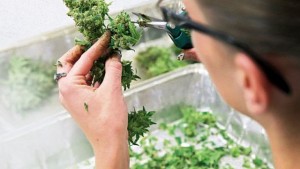 THE University of Technology, Jamaica (UTech) and the University of the West Indies (UWI) will be the first two educational institutions to be issued with licences to grow marijuana for research purposes under the new provisions of the Dangerous Drugs Act, which took effect yesterday.
THE University of Technology, Jamaica (UTech) and the University of the West Indies (UWI) will be the first two educational institutions to be issued with licences to grow marijuana for research purposes under the new provisions of the Dangerous Drugs Act, which took effect yesterday.
Minister of Science, Technology, Energy and Mining Phillip Paulwell made the announcement yesterday in his presentation in the 2015/16 Sectoral Debate in Gordon House.
He said that, as the country moves to build an industry for medicinal ganja, it is crucial for research institutions such as these to have the required authority to cultivate the plant. “If Jamaica wants to establish itself as a centre of excellence for research in ganja, this should be the home of research and development in ganja,” he said.
Paulwell pointed out that, as it stands now, institutions are allowed to use marijuana for research, but under the auspices of the police. The science and technology minister stressed that the licences come with strict conditions. “It’s not a free-for-all… or to promote smoking of ganja, it is to recognise that this product has tremendous value,” he said.
He also sought to allay apprehension about who would benefit from a local medical ganja industry, stating that the market was large enough to accommodate small and large farmers and urged cooperation and sharing of information to allow sharing of the expected benefits.
The licence will be for a specified period and subject to monitoring of the research activities to ensure that they are in keeping with what was approved.
The development of a medical ganja industry is supposed to be one of the major benefits of the decrimminalisation of ganja under the watch of a Cannabis Licensing Authority, which is to be responsible for the establishment of a regulated hemp and medicinal ganja industry. The medical ganja industry is said to be a US$2.5-billion market in the United States alone.
The law came into the affect just over a month after it was pushed through Parliament. Under the law, people caught in possession of two ounces or less of the substance will not get a criminal record, but will instead have to pay a $500 fine within 30 days. Those who fail to pay the penalty must appear before the petty sessions court, where they could be ordered to pay a $2,000 fine.
The Bill does not provide for the legalisation of ganja, however, and prohibits the smoking of ganja in public places. According to the new law, minors who appear to be addicted to the substance are to be referred to the National Council on Drug Abuse.
